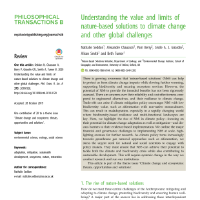Challenge 2 – Nature-based solutions to climate change
How can natural ecosystems be used for climate change adaptation and mitigation?
Preliminary questions
Can protection and restoration of nature be used to sequester carbon in significant amounts and help us adapt to climate change?
What problems might arise from adopting Nature-based Solutions, and how do we overcome them?
How is biodiversity important for people? How can we communicate that?
How may the risks of ecosystem collapse and runaway climate change be mitigated?
Related resources
Teams
Over the 3-day enviroSPRINT, Teams rapidly investigated their Challenge area, identified a key problem and innovated potential solutions. The Teams demonstrated a prototype of their solution to a panel of expert judges who assessed the novelty and feasibility of the concept, along with the quality of the presentation, and selected a winner (★). Alongside this, each Team produced a 90-second summary of their idea to share with a wider audience. These can be viewed on the Team pages:
Team 2B ★
Experts
We are grateful to have the support of our expert panel:
Dr Richard Bradbury – Head of People Conservation Science, Conservation Science, RSPB
Richard leads the new ‘people conservation science’ team at RSPB’s Centre for Conservation Science, monitoring and understanding the human side of conservation issues, testing solutions to problems and evaluating whether actions work. The team has a particular interest in measuring and valuing nature’s contributions to people, in particular natural climate solutions and sustainable agriculture, and understanding the roles of nudges, perceptions, attitudes and connection to nature for influencing behaviour change. The team works in close collaboration with other teams in the Centre for Conservation Science, colleagues across RSPB and Birdlife International, and a wide range of other academic, statutory agency, government and NGO partners.
Roger Mitchell
Roger is Chair of the Cambridge Conservation Forum, a network of 70 conservation organisations based in and around Cambridge working at local, national and international levels. He is also a Council Member of the Cambridge Conservation Initiative, Board Member of Natural Cambridgeshire (the Local Nature Partnership) and Chair of the Fens Biosphere Steering Group. Most of his working life has been in Government and the Government Agencies as Senior Scientist in the Department of the Environment’s Central Water Planning Unit, Head of Marine Science in the Nature Conservancy Council and the Joint Nature Conservation Committee and National Manager of Species and Biodiversity in English Nature. Since then, he has been International Chief Scientist at the Earthwatch Institute, Executive Chairman of the NGO Natura International, Environmental Director of the Arcadia Fund and Chairman of the Management Board of the Corrour Estate. Currently, he is a Director of the NGO Amphibian and Reptile Conservation, a Director of ARC Ecological Services Ltd and on the editorial board of Conservation Evidence.
Keith Moore – Sustainable Places Account Manager (East Anglia area), Environment Agency
In Keith’s role with the Environment Agency he manages senior and strategic relationships with governmental and non-governmental organisations in the East Anglia area. This includes work with Local Enterprise Partnerships where Keith is a member of the growth sector group and also the economic recovery group. Keith is actively involved in working with and supporting Local Authorities in terms of Climate Change / Net Zero and Carbon Neutral aspirations. He recently led a group of strategic land use planners in Norfolk to produce a piece of work about the role of land use planning in adapting to a changing climate. He also works with key regeneration initiatives in areas of deprivation in the region e.g. Jaywick on the Essex Coast. One of Keith’s priorities is to embed the value of natural resources in decision-making by organisations involved in land use planning, the environment and the economy.
Dr Tom Swinfield
Tom is a tropical ecologist working at the coal face of forest restoration. He has lived on four continents, including the forests of central Sumatra and as a teacher in a school for street kids in Cape Town. Tom is a confident communicator in Indonesian with ample expertise collaborating with scientists, farmers and government. He is driven to understand what works to protect forests and address the climate crisis, which has honed his talent for experimental design, computer programming and statistics. Tom has published scientific articles using a variety of approaches, including cutting-edge remote sensing techniques and machine learning. Most recently Tom has embarked on a new adventure as an entrepreneur developing private sector approaches to accelerate forest restoration and capture carbon.
Dr Eleanor Tew – Natural Capital and Resilience Programme Manager, Forestry England
Eleanor’s academic background is in ecology and conservation. Joining the University of Cambridge Conservation Science Group in 2015, her PhD explored ecosystem service delivery in forestry. Following her PhD, Ealeanor joined Forestry England, managing the Forest Resilience Programme in the East District. She is now the national Natural Capital and Resilience Programme Manager for Forestry England, where her role is to embed these concepts into day-to-day decision-making, and improve the overall value and resilience of the nation’s forests.
Challenge organisers
Cambridge ESS & Doctoral Training Partnership (DTP) & C-CLEAR DTP

The Cambridge Earth System Sciences (ESS, 2014-2018 intakes) and Climate Life and Earth (C-CLEAR, 2019 intake-onward) NERC Doctoral Training Partnerships provide PhD training across NERC science. Embedded in the outstanding research environments of the University of Cambridge and the British Antarctic Survey (BAS), the Cambridge NERC DTPs are organised around three major research themes: Solid Earth and Geological Hazards, Climate Change and Environmental Processes, and Biology and Conservation.
Students in the ESS and C-CLEAR cohorts engage in research projects of global significance across NERC science, and receive high-quality training in research, professional, technical and transferable skills through a focused core programme. Training is guided by personalised advice and the expertise of a network of partners in industry, government, the third sector and beyond.
Cambridge Conservation Initiative (CCI)

The Cambridge Conservation Initiative (CCI) is a unique collaboration between the University of Cambridge and nine leading internationally focused biodiversity conservation organisations based in and around Cambridge, UK.
The CCI partners together combine and integrate research, education, policy and practice to create innovative solutions for society and to foster conservation learning and leadership.


